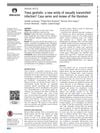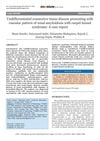 62 citations,
June 2015 in “Sexually Transmitted Infections”
62 citations,
June 2015 in “Sexually Transmitted Infections” Sexual activity can spread T. interdigitale, needing quick antifungal treatment to avoid permanent scarring.
 11 citations,
December 1921 in “Archives of dermatology and syphilology”
11 citations,
December 1921 in “Archives of dermatology and syphilology” A rare scalp disease causes hair loss, pus-filled nodules, and scarring.
Gel 2, with shark liver and borage oil, is effective for reducing inflammation and healing wounds.
 30 citations,
May 2004 in “Journal der Deutschen Dermatologischen Gesellschaft”
30 citations,
May 2004 in “Journal der Deutschen Dermatologischen Gesellschaft” The document concludes that early diagnosis and treatment are crucial for children with hair loss to prevent permanent damage, although not all conditions can be effectively treated.
 291 citations,
January 2014 in “The Scientific World Journal”
291 citations,
January 2014 in “The Scientific World Journal” Lichen Planus is a less common condition affecting skin and mucous membranes, with various types and associated risk factors, challenging to diagnose, significantly impacts life quality, and may have a risk of cancerous changes in oral lesions.
 126 citations,
January 1987 in “Journal of The American Academy of Dermatology”
126 citations,
January 1987 in “Journal of The American Academy of Dermatology” The document concludes that understanding hair structure is key to diagnosing hair abnormalities and recommends gentle hair care for management.
 40 citations,
November 2016 in “Molecules”
40 citations,
November 2016 in “Molecules” Some plants used in traditional medicine may help treat cancer because they contain proteins that can inactivate ribosomes.
 January 2023 in “International Journal of Molecular Sciences”
January 2023 in “International Journal of Molecular Sciences” Maxillariinae orchids contain 62 compounds with potential health benefits, including treating skin conditions and diseases like cancer and diabetes.
 7 citations,
July 2011 in “Survey of Ophthalmology”
7 citations,
July 2011 in “Survey of Ophthalmology” The document concludes that periocular hair disorders have various causes and treatments, and proper evaluation by specialists is important for management and prognosis.

Accurate diagnosis of cicatricial alopecias requires thorough scalp examination and multiple biopsy techniques.
254 citations,
December 2003 in “Journal of the American Academy of Dermatology” Accurate diagnosis and aggressive treatment are crucial to prevent permanent hair loss in cicatricial alopecia.
 48 citations,
May 2013 in “Canadian Medical Association Journal”
48 citations,
May 2013 in “Canadian Medical Association Journal” Primary cicatricial alopecia, a rare disorder causing permanent hair loss, is hard to diagnose and treat, with treatments like anti-inflammatory drugs and steroids offering varied results and no guaranteed cure. Psychological support for patients is important, and future research should aim to identify causes of the condition.
 August 2022 in “Case reports”
August 2022 in “Case reports” Isotretinoin effectively treated a rare scalp condition, but careful drug monitoring and a dairy-free diet were important.
 5 citations,
March 2017 in “Natural Product Research”
5 citations,
March 2017 in “Natural Product Research” Researchers found eight natural compounds and essential oils in the Italian plant Bituminaria basaltica, which are typical for its genus and known for bioactivity.
 3 citations,
January 2024 in “Cureus”
3 citations,
January 2024 in “Cureus” Folliculitis decalvans was successfully treated with doxycycline and ozenoxacin.
 June 2023 in “British journal of dermatology/British journal of dermatology, Supplement”
June 2023 in “British journal of dermatology/British journal of dermatology, Supplement” A woman's rare hair loss condition improved on its own, suggesting this type might recover like common cases.
 155 citations,
June 2009 in “International Journal of Dermatology”
155 citations,
June 2009 in “International Journal of Dermatology” Lichen planus is a skin condition that can resolve on its own, is linked to hepatitis C, and increases the risk of skin cancer.
 27 citations,
July 2018 in “Journal of optometry”
27 citations,
July 2018 in “Journal of optometry” Eyelashes protect the eyes, but more research is needed to understand how.
 8 citations,
March 1979 in “International Journal of Dermatology”
8 citations,
March 1979 in “International Journal of Dermatology” Dr. Vera H. Price's 1979 work emphasizes the importance of accurate diagnosis and personalized treatment for hair loss.
 December 2018 in “Esperienze dermatologiche”
December 2018 in “Esperienze dermatologiche” A lotion with Centella asiatica extract reduced hair loss by 41% and increased hair strength without side effects.
 January 2014 in “International Journal of Case Reports and Images”
January 2014 in “International Journal of Case Reports and Images” A woman with undifferentiated connective tissue disease was diagnosed with renal amyloidosis and carpal tunnel syndrome.
 1 citations,
December 2015 in “Vestnik dermatologii i venerologii”
1 citations,
December 2015 in “Vestnik dermatologii i venerologii” Patients with non-scarring alopecia often experience emotional disorders like depression and stress.
 January 2015 in “Вестник дерматологии и венерологии”
January 2015 in “Вестник дерматологии и венерологии” Patients with non-scarring hair loss often have emotional disorders.





















